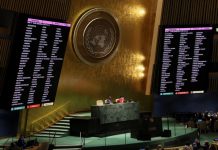On Friday, China decided to take off the British Broadcasting Corp.’s (BBC) World News from being aired in China. The move comes after the United Kingdom (UK) regulator’s decision to revoke the Chinese state-backed broadcaster China Global Television Network’s (CGTN) license last week.
According to Chinese state authorities, BBC reports on China violated regulations by failing to meet the criteria of being “truthful and fair”. The statement was released by China’s National Radio and Television Administration, on Friday in Beijing. “The channel fails to meet the requirements to broadcast in China as an overseas channel,” the Radio and Television Administration said, adding it would not accept BBC’s broadcast application for the next year.
BBC was already not widely accessible in China outside of some hotels, businesses and residential compounds for foreigners.
In response to the situation, a BBC spokesperson told the media, “we are disappointed that the Chinese authorities have decided to take this course of action”. She further added that “the BBC is the world’s most trusted international news broadcaster and reports on stories from around the world fairly, impartially and without fear or favour.”
Foreign Secretary for the UK Dominic Raab said in a tweet that the decision represented an “unacceptable curtailing of media freedom” and that it would damage China’s reputation.
The situation escalated when Hong Kong’s public broadcaster RTHK said in a statement it would suspend the relay of BBC World Service and BBC News Weekly from 11 p.m. on Friday, citing the decision by China’s National Radio and Television Administration as the reason for its move.
Background
Last week, the UK’s media regulator the Office of Communications (Ofcom) stated that CGTN’s license holder, a company called Star China Media Ltd., didn’t have editorial control over broadcasts in the U.K., according to an investigation published by the watchdog, last Thursday.
CGTN had asked for its license to be transferred to an entity called China Global Television Network Corporation, stated Ofcom, but “crucial information” was missing from the application. Ofcom stated that the license was revoked as the media house “would be controlled by a body ultimately directed by the Chinese Communist Party”.
In a statement, CGTN expressed “strong opposition” to Ofcom’s findings while defending its record as a “professional” media organization and adding that the decision was met with disappointment. The broadcaster said it would “continue to promote understanding, communication, trust and cooperation,” while adding that it had complied with local laws and regulatory metrics.
After the UK authorities’ decision, Chinese officials had asked the BBC to apologize over its coverage of the COVID-19 break out in China, after complaints by authorities over the content. The BBC responded by saying it rejected “unfounded accusations of fake news or ideological bias.” The news organization had recently reported and published content critical of President Xi Jinping’s government on censorship and the human rights abuses against Uyghur Muslims in camps in the country’s Xinjiang region.
Previously, the UK’s mobile providers were banned from buying new Huawei 5G equipment, over security and data concerns. These sanctions followed Washington’s lead, which claimed the firm poses a national security threat – something Huawei denied.
Tensions between China and the U.K. have been rising. Last year, Prime Minister Boris Johnson banned Shenzhen telecommunications company Huawei Technologies Co. from Britain’s next-generation wireless networks amid security concerns.
China vs the West
With China’s rise as a major world player, the anxieties of the western powers have been laid bare. The US and its allies have constantly made statements to “contain” China’s influence. That is not to say that China does not have human rights abuses or absolves the Asian superpower of any misuse of power. However, the language used to discredit China is always in a discourse of rights, abuse and democracy.
Kerry Brown, a British sinologist academic of history and politics, echoes these concerns as an issue of the West’s declining power rather than genuine moral concerns against China. He argued that the last few world crises had been created by the western powers, which led to extensive abuses of human rights and democracies worldwide.
“COVID19 carries deep symbolic weight. As of August 2020, China, where most believe the virus started, has managed to control the spread of the infection and is now emerging from the initial phase of the economic downturn by reporting a 3.2% GDP rise in the second quarter of the year,” said Brown, “as this happens, Europe is moving into a deep recession, with fears of a second spike in infections and fatalities. The UK has shrunk by a fifth of GDP in the first three months of the year while suffering one of the worst levels of death from the disease. By the end of June, America had lost around 12 million jobs and saw its GDP contract by 4.8 per cent, with a 30 per cent contraction predicted, the worst figure ever recorded. It, too, is still fighting the disease, with issues like the wearing of masks politicised and fought over.”
For the foreseeable future, the relation of the West with China is likely to deteriorate. The USA has resumed its global watchdog role and recently stated that it is closely watching the Sino-Indian border escalation. With the pushback against growing Chinese influence, Chinese media and technology would be a consistent target for the western allies.









